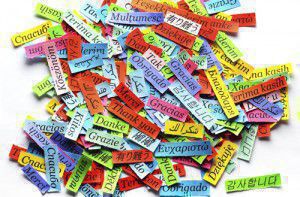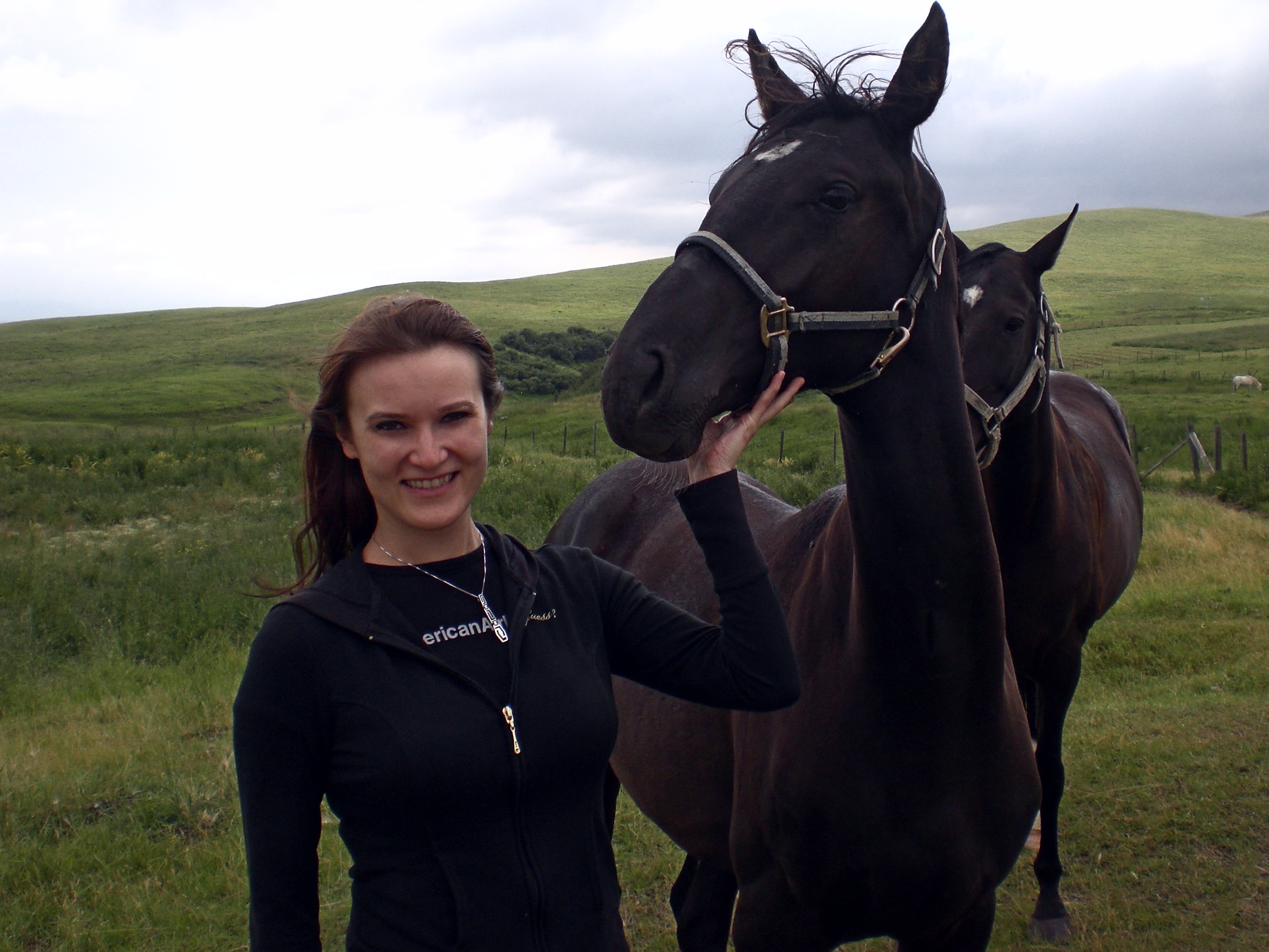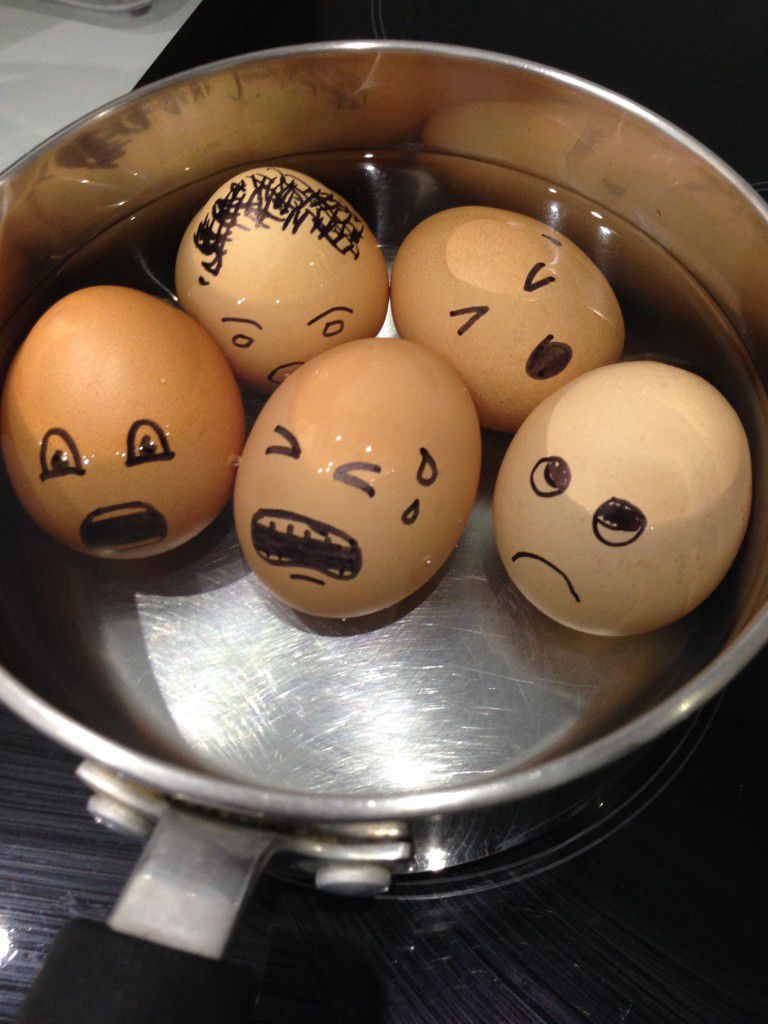Lost, drowned, in a shirt… how do you like your eggs?
Happy World Egg Day!
English is quite a boring language when it comes to eggs. We boil them, scramble them, poach them, fry them. All very ordinary.
Which is why we were delighted to discover that other languages are more dramatic in their approach to eggs!
Over to Italy:
For Italians, poached eggs are literally ‘eggs in a shirt’ – ‘le uova in camicia’ – possibly because the frilly poached egg white looks like the sleeves of a loose blouse.
Alternatively (but still quite theatrically), you can call them ‘le uova affogate’ (literally ‘drowned eggs’). Poor old eggs!
And now to Germany:
Maybe it’s the same idea of drowning that makes Germans call their poached eggs ‘verlorene Eier’ – ‘lost eggs’. The eggs, like sailors lost at sea, drown quietly in the saucepan.
Or, if it’s a fried egg you’re after, the Germans have a pretty expression for that too: ‘Speigeleier’, literally ‘mirror eggs’. Can anyone tell us why..?
Bullseye!
In Italian, Slovak and Czech (to name but a few), the fried egg is the ‘bullseye egg’- because, of course, it resembles a bullseye (or a porthole, which is the same word): ‘le uova all’occhio di bue’ (Italian), ‘volské oko’ (Slovak), ‘volská oka’ (Czech).
Eyes in a pan?
A similar idea, though slightly more graphic, applies in Bulgarian and Slovenian where the fried eggs (‘яйца на очи’ and ‘jajce na oko’ respectively) translate as ‘eggs eye-style’! So next time you fry an egg, you may choose to remember this vocabulary by imagining a big eyeball staring up at your from the plate… OR you may choose to stick to the safe, if rather boring, English equivalent.
Got any other interesting egg-related vocabulary? Let us know!
How do you choose which language to learn?
Everyone’s always talking about how useful it is to speak another language – and they’re right, for so many reasons. There’s lots of advice too on how to get started and how to stay motivated when it gets tough. But the first question any aspiring language learner should ask themselves is, ‘Which language do I want to learn?’
Sometimes this is easy, because you’re moving to another country, or you’ve met a new partner who speaks a particular language. Even if this means you end up learning a language most people would consider unusual, to you it has a purpose and that makes it anything but obscure.
But what if you’ve just decided you want to learn a language, because you’ve heard that people with a second language earn more, or that learning a language makes you cleverer, and don’t have a particular one in mind?
 At EuroTalk, we offer nearly 140 different world languages. It’s a pretty daunting selection to be greeted with when you’ve just Googled ‘I want to learn a language’ and stumbled on to our homepage, or downloaded the uTalk app. And that doesn’t even come close to the total number of languages spoken in the world. So how is anyone meant to choose one to learn? Do you just close your eyes and point at one?
At EuroTalk, we offer nearly 140 different world languages. It’s a pretty daunting selection to be greeted with when you’ve just Googled ‘I want to learn a language’ and stumbled on to our homepage, or downloaded the uTalk app. And that doesn’t even come close to the total number of languages spoken in the world. So how is anyone meant to choose one to learn? Do you just close your eyes and point at one?
Well no, we don’t recommend that approach; you could end up with something really fun that way, but at the same time, learning a random language just for the sake of it, when there’s very little chance you’ll ever get a chance to speak it, seems a shame. Half the fun of learning a language is getting to share it with other people.
So here are our recommended criteria for choosing a language:
Number of speakers
Generally, a language with more speakers is going to be more useful to you, because you’re going to have more opportunities to speak it. According to Ethnologue, the top five most spoken languages in the world are Chinese, Spanish, English, Hindi and Arabic, with a total of 2.4 billion speakers between them, so knowing one of these languages is going to guarantee you lots of people to talk to.
On the other hand, it depends on your reasons for wanting to learn a language. If it’s to make friends all over the world, one of these five languages will stand you in good stead. But if it’s to improve your employment prospects, bear in mind that you might face more competition if you’ve chosen a popular language. I studied Spanish at university, which is in great demand with employers. But so did lots of other students. We’ve got five people who speak Spanish at EuroTalk – two of them are native speakers (there are less than twenty of us in total, to put that in context) so it’s rare for me to be called on to use my language skills. Something like Portuguese or Japanese, which are still in the top ten in Ethnologue’s list, might offer fewer opportunities but when one comes along, you’re probably not going to face as many rivals for the job.
Where it’s spoken
Another important factor. Firstly, you don’t want to learn a language that’s spoken in a country you never intend to go to, or in which you’ve no interest. Secondly, some languages, like French, Arabic or English, are spoken in many different countries. So if you’re going travelling and want a language you’ll be able to use in more than one place, one of these will be more useful to you. But if travel’s not top of your agenda, this might not be such a big consideration.
Similarity to other languages
Most world languages are organised in families, which means they come from the same root as the other languages in that family. This means often, although you may only speak one language, you can probably at least make yourself understood in another. Hindi and Urdu, for example, are mutually intelligible, as are Czech and Slovak. If you know Spanish, you can make a reasonably decent attempt at Portuguese or Italian, and although you might make a few mistakes, chances are you’ll be understood. I’m not suggesting you should go around speaking the wrong language at people, but if you do make an honest slip-up, or just can’t think of the right word, you’ll probably be ok. I’m fairly sure I spoke quite a bit of Spanish when I was in Italy earlier this year, but everyone seemed to understand what I was getting at.
Some languages, though, don’t have any close neighbours, or indeed any neighbours at all. Basque, for example, is what’s known as a language isolate, as is Korean. This means they don’t belong to a family, but stand alone, so if you’ve chosen one of these languages, it’s worth remembering that it won’t help you with any others.
Your interests
Partly, this is to do with your travel interests. If you’ve a particular interest in Russia, for example, we’d recommend you learn Russian. But even if you’re not particularly interested in travelling, there are other things to consider. Are you a fan of opera? Maybe give Italian a go. Anime? Japanese. Star Trek? Klingon.
Or maybe you’ve got a particular interest in endangered languages, in which case you might want to learn Cornish or Sardinian, not necessarily for the wealth of communication opportunities it offers, but to help save a valuable world language from extinction.
Your commitment
You know yourself better than anyone. How motivated do you feel? Is this just a passing whim that you’re likely to give up the moment it gets difficult, or are you prepared to stick at it? The fact is, some languages are harder than others, and this is different for everyone, depending on your native language. For Europeans, Dutch is considered quite an easy language to learn, while Mandarin Chinese is very difficult. But someone living in Japan may find Chinese much easier to learn than any European language.
So if you’re living in Europe and intending to learn Mandarin, you’ll need to be pretty dedicated. And if you know you don’t have it in you, it might be better to try something else rather than face disappointment when it doesn’t work out. Nobody’s bad at all languages – you just need to find the right one for you.
If you’re still undecided, and in need of some inspiration, take our quiz – it’s not at all scientific, but might give you some ideas!
Or even better, why not try a few out? You can do this for free on our website, or by downloading uTalk for iOS.
If you have any other tips or suggestions for readers trying to choose a language, please share them in the comments.
Liz
10 sport stars who speak other languages
 It can often feel like life is all about sport, whether we like it or not. But have you ever wondered how good sports stars are at languages?
It can often feel like life is all about sport, whether we like it or not. But have you ever wondered how good sports stars are at languages?
It turns out, pretty good. Like anyone who has to travel a lot for their work, athletes often find knowing only their native language isn’t enough. Here are 10 great examples of sports stars who speak more than one language.
Gary Lineker
Besides English, the former footballer learnt Spanish while he was playing for Barcelona, and picked up some Japanese when he later moved to Nagoya Grampus Eight. He’s now a passionate ambassador for languages in schools, saying in an interview with TES last year, ‘the learning of languages, for me, will always be helpful for the vast majority at some stage in their life’.
Roger Federer
Not content with winning a frankly quite ridiculous 17 Grand Slam titles, the Swiss tennis player also speaks four languages fluently – his native Swiss German along with French, English and German. He’s known for his ability to switch effortlessly between languages in interviews and press conferences and can quite comfortably answer journalists’ questions in their own language, a feat some of his fellow tennis players can’t keep up with. Wouldn’t be the first time.
Tom Daley
The British diver recently got an A in his Spanish A-level (congrats, Tom!), and makes good use of his language skills when in Mexico, where he spends a lot of his time. Here’s a video of him showing off his Spanish.
Jonny Wilkinson
Here in England, Jonny Wilkinson is known (at least by me) as that guy who’s pretty good at drop goals. But he’s also a bit of a superstar in France, where he’s been playing for Toulon since 2009. He’s now fluent in French and was awarded honorary citizenship of Toulon earlier this week – giving his acceptance speech in the local language, of course.
Fernando Alonso
The Spanish Formula One racing driver speaks an impressive four languages – Spanish, Italian, English and French. And in case that’s not enough, he’s apparently working on Russian too.
Arsene Wenger
The Arsenal manager is well known for his interest in languages, speaking French, English, German, Spanish, Italian and Japanese. Like Gary Lineker, Wenger’s also known as an ambassador for languages, and last year he was voted Britain’s first Public Language Champion by readers of The Guardian. In this video he explains why languages are so important.
Novak Djokovic
Never one to let Roger take all the glory, fellow tennis champion Novak Djokovic speaks five languages – Serbian, English, German, Italian and French. He studied English and German at primary school, and learned Italian when he worked with coach Riccardo Piati. In an interview with Tennis Talk in 2013, he said, ‘We have a saying in our country: The more languages you know, the more is your worth as a person. I like to understand what people are saying wherever I am, at least to pick up a few phrases of those languages.’
Paula Radcliffe
Long-distance runner Paula Radcliffe has a first-class degree from Loughborough University in European Studies, and speaks French and German fluently. She now lives in Monaco with her husband and two children, who are both bilingual, attending a French school but also fluent in English.
Cesc Fabregas
Another Barcelona footballer, Fabregas speaks four languages – Spanish, Catalan, English and French, and his Twitter feed is multilingual. When asked about his language skills in 2005, he replied, ‘These days you have to keep studying, not least because my mum tells me so.’ Words to live by.
Daniela Hantuchova
And finally, another tennis player, because tennis is my favourite. Daniela Hantuchova, from Slovakia, is by all accounts a very talented lady. Besides her tennis career, she’s also a trained classical pianist, and speaks – wait for it – six languages: Slovak, Czech, English and German fluently, and some Croatian and Italian.
Does anyone else feel like a bit of an underachiever now, or is it just me?
If you know any other examples of sports stars who speak other languages, please tell us about them in the comments.
It’s Raining Cats and Dogs (and Wheelbarrows and Old Ladies)
‘It’s raining cats and dogs!’ is a common British phrase meaning that it’s raining particularly hard. There are various theories as to where the expression came from – although there’s no evidence that it’s ever actually happened!
It may come from the Greek expression cata doxa. This means ‘contrary to experience or belief’ and might explain why the expression is used when it’s raining unusually hard.
Equally, it could be derived from the old French word catadupe, which meant waterfall.
An old theory was that in heavy rain, dead animals would often be washed out of drainage systems on 17th century buildings in Europe.
There’s no conclusive answer. It may just be that it was a funny expression that caught on and became popular. We’ll probably never know…
In Britain it also rains buckets, stair rods, tacks and pitchforks… But did you know that in other areas of the world, it rains other things?
Our favourites are:
‘It’s raining wheelbarrows’
Czech: Padají trakaře
‘It’s raining knives and forks’
Welsh: Mae hi’n bwrw cyllyll a ffyrc
‘It’s raining shoemakers’ apprentices’
Danish: Det regner skomagerdrenge
‘It’s raining fire and brimstone’
Icelandic: Það rignir eld og brennustein

‘It’s raining lady trolls’
Norwegian: Det regner trollkjerringer
‘It’s raining husbands’
Spanish: Están lloviendo maridos
‘It’s raining old women with knobkerries’
Afrikaans: Ou vrouens met knopkieries reen (by the way, a knobkierrie is a kind of African club!)
‘It’s raining snakes and lizards’
Brazilian Portuguese: Chovem cobras e lagartos
‘It’s raining frogs’
Polish: Leje zabami
We’d love to know where some of these expressions came from, so if anyone has any information, please share it in the comments!


